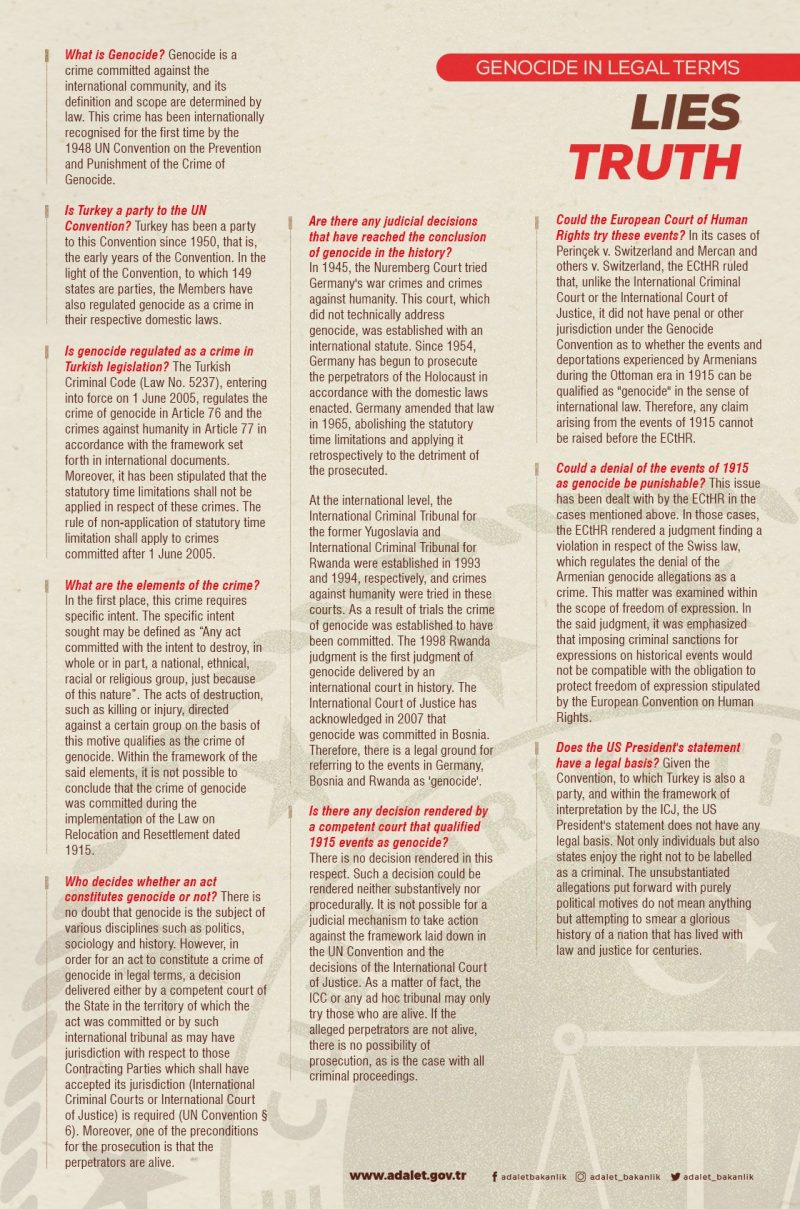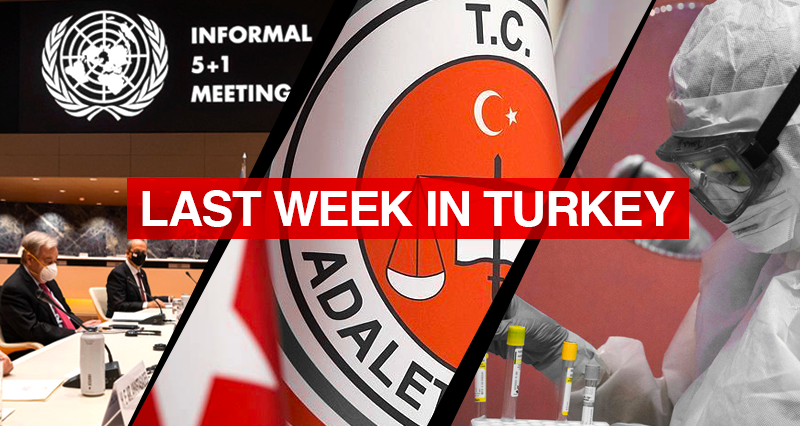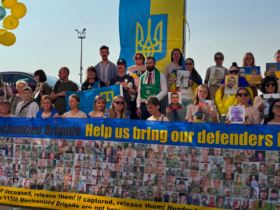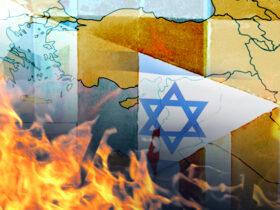Last week, the public agenda in Turkey was busy with three main topics.
The first was the unofficial diplomatic talks between the Turkish and the Greek Cypriots, with the participation of three observers, Turkey, Greece and the UK, under the mediation of the United Nations.
The second was the infographics published by the Turkish Ministry of Justice regarding the truths and the lies of the events of 1915.
The third had been the ongoing vaccination efforts and lockdowns against the COVID-19 pandemic.
Cyprus Talks in Geneva
An unofficial diplomatic dialog in Geneva began on April 27 between Turkish and Greek Cypriot representatives, three guarantors of the island, Turkey Greece and the UK, under the mediation of the UN.
The President of the Turkish Republic of Northern Cyprus Ersin Tatar represented the Turkish Cypriot community, while the Turkish Foreign Minister Mevlut Cavusoglu represented on behalf of Turkey, one of the three guarantors of the island.
Greek Cypriot leader Nicos Anastasiades had attended on behalf of the Greek Cypriot community, while Greek Foreign Minister Nicos Dendias, and UK Foreign Secretary Dominic Raab had represented the other two guarantors of the island.
On the first day of the talks, Tatar presented a six-point proposal to the UN stressing the establishment of a cooperative relationship between the two sides on the island, with both enjoying equal international status.
Cavusoglu said Greek Cypriot leader Nicos Anastasiades was not able to bring a new vision to the talks in Geneva but rather rehashed “existing rhetoric.”
Cavusoglu said Turkey would continue to support the two-state solution based on sovereign equality endorsed by the TRNC, stressing that they would not compromise on the independence, sovereignty, or equality of Turkish Cyprus.
“We expressed our own views clearly. Of course, there is no change in our position and there shall not be,” Tatar told journalists after his 40-minute presentation on the issue.
On day two of talks in Geneva, President Ersin Tatar said that Turkish Cyprus is standing firm on the need for a two-state solution.
“We explained our position on a two-state solution in the given time frame in detail and with justification at the 5+1 talks” he said.
“I said many things have changed, the context and conditions have changed,” said Tatar, reminding the island’s violent history in the 1960s, and the 2004 Annan plan which resulted in a rejection by the popular vote of the Greek Cypriots.
Tatar also thanked Turkey for completely supporting the Turkish Cypriots’ position.
During three days of talks this week, the Greek Cypriot administration insisted on the failed federation model on the island and also suggested constitutional changes that are “unacceptable” for TRNC, Ersin Tatar stated.
Alongside Turkish Foreign Minister Mevlut Cavusoglu, Tatar stressed that Turkish Cypriots have their own state and will not accept minority status in a Greek Cypriot-ruled federation. He said before starting formal negotiations on a settlement, the equal international status and sovereign equality of the two sides must be recognized.
Cavusoglu also said the hydrocarbon issue and the issue of revenue sharing are important issues that recently caused tension in the Eastern Mediterranean, yet the Greek side clearly showed that they do not want to share hydrocarbon revenues with the TRNC.
At the end of the talks on Thursday, the UN Secretary-General Antonio Guterres said that there was “no common ground yet” to resume formal negotiations on a Cyprus settlement.
“We have been able to agree that I will convene in the near future another meeting of the 5+1, again with the objective to move in the direction of reaching the common ground to allow for formal negotiations to start,” said the UN chief, referring to the format of the meeting: both sides on the island, the guarantor countries Turkey, Greece, and the UN, plus the EU.
“We are determined to do everything we can to make this dialogue move on,” said Guterres.
Infographics Published by Turkish Ministry of Justice Regarding the Events of 1915
On Monday, the Turkish Justice Ministry responded to the claims regarding the events of 1915 with an infographic containing truths and lies in legal terms on the issue after US President Joe Biden called the events of 1915 a “genocide”.
The infographic gathered all the facts under 10 questions, which were:
- What is a genocide?
- Is Turkey a signatory party to the UN convention on genocides?
- Is there a law regarding the genocides in the Turkish law code?
- What are the definitions of this crime?
- Which institutions can decide whether an action is a genocide or not?
- Are there any court verdicts in history, which decided on an action that was indeed a genocide?
- Is there any acting and authorized court, that has defined the events of 1915 as genocide, and could there ever be?
- Can the European Court of Human Rights make a judgment on the events of 1915?
- Can the act of not accepting the events of 1915 as a genocide, be criminalized?
- Is there any legal basis on the statements of the US President?
The infographic stressed that Turkey has been a party to the 1948 UN Convention on the Prevention and Punishment of the Crime of Genocide since 1950, while also regulated the crime of genocide in their domestic law code.

The infographic read: “The Turkish Penal Code numbered 5237, which entered into force on June 1, 2005, regulates the crime of genocide in Article 76 and crimes against humanity in Article 77 by the framework set forth in international documents.”
“With this motive, acts of destruction such as killing and injuring, directed towards a certain group cause genocide crime,” it said.
Answering the question of who decides an act to be genocide, it said undoubtedly, genocide is of interest to various disciplines such as politics, sociology and history.
“However, for an act to constitute a crime of genocide legally, either the jurisdiction of the country where the alleged acts took place or an international judicial mechanism (international criminal courts or International Court of Justice) with jurisdiction must decide on the issue,” it said, referring to Article 6 of the 1948 UN Convention.
The accused must be alive for a prosecution to be initiated, it added.
Answering the question of whether there are judicial decisions concluded as genocide in world history, it said in 1945, the Nuremberg Court tried Germany’s war crimes and crimes against humanity.
It recalled that the court, which technically did not handle genocide, was established with an international status.
On the question of whether there is an authorized court decision describing the events of 1915 as “genocide,” it said there is no judicial decision on this matter and it is not possible principally and formally.
“It is out of the question for a judicial mechanism to take action against the framework laid down in the UN Convention and the decisions of the International Court of Justice,” the document emphasized.
On the question of whether the European Court of Human Rights Can make a judgment on the 1915 events, the infographic stated “In its Perincek vs Switzerland case, the European Court of Human Rights (ECHR) stated that it does not have the authority to make binding decisions contrary to the International Criminal Court or the International Court of Justice in the context of the Genocide Convention regarding the events experienced by the Armenians during the Ottoman Empire in 1915 and whether the deportation could be deemed ‘genocide’ in international law.”
“Therefore, any claims based on the 1915 events cannot be put forward before the ECHR,” the ministry said.
Answering the question of whether not recognizing the events of 1915 as genocide can be punished, it referred to the above-mentioned ECHR trials and said: “In these cases, the Swiss law, which considers it a crime to deny the Armenian genocide allegations, received a violation decision from the ECHR.”
The issue has been evaluated within the scope of freedom of expression, it said.
On the question, if there is any legal basis to US President Biden’s remarks, it said: “Considering the Genocide Convention, to which our country is also a party, and the ICJ jurisprudence interpreting this agreement, the US president’s statements have no legal basis.”
“The unfounded claims put forward totally with political motives do not mean anything other than the quest to denigrate the glorious history of a nation that has lived with justice and law for centuries.”
Vaccination Efforts and Lockdowns Against the Coronavirus Pandemic
As a public health measure to control the virus, Turkey started a full-fledged lockdown from last Thursday evening and until May 17.
A positive effect of this has been the daily number of cases dropping to 25,980 (back from +40,000 earlier this week), including 2615 symptomatic patients, according to the latest Health Ministry data.
The total number of cases in Turkey is now nearly 4.87 million, and the number of daily deaths is still high at 340, while the total death count has reached 40,844.
Total coronavirus recoveries have surpassed 4.4 million, as authorities said on Friday.
More than 47.7 million coronavirus tests have been conducted in Turkey to date, and the number of COVID-19 patients in critical condition stands at 3,532.
Turkey has so far administered over 23 million vaccine shots since a nationwide immunization campaign that began on January 14, 2021.
More than 13.82 million people have received their first doses of a vaccine, while over 9.25 million people have completed a two-dose vaccine course, according to the Health Ministry’s data.
The lockdowns will remain through the holy month of Ramadan, as well as the three days of Eid al-Fitr.
“So far, Turkey administered nearly 23 million doses of COVID-19 vaccine, and we currently have 6 million doses still on hand,” said Fahrettin Koca at a news conference on Friday.
Those 6 million doses of COVID-19 vaccines include Sinovac and BioNTech vaccines, according to Koca.
Turkey has also recently announced that the time between the two doses of the BioNtech vaccine had been extended up to six to eight weeks.
Turkey also expects to receive the first shipment of the Russian Sputnik V vaccine during May, said the Health Minister.
Commenting on the matter, Koca said the decision of the Coronavirus Scientific Committee was “misunderstood.”
“First of all, this decision is a scientific one, taken by examining concrete evidence-based data and based on scientific reasons,” he added.
Recalling that the country has approved the emergency use of the Sputnik V vaccine on Friday, Koca said Turkey expects to receive 50 million doses of the vaccine in a six-month period and the first shipment to be received in May.
“Administering of this vaccine will begin in the country as soon as possible,” he added.
Telling that the supply of COVID-19 vaccines will be much more frequent in June, the Turkish minister said: “We are determined to vaccinate our citizens aged 40 and over by June at the latest. We are aiming to vaccinate everyone aged 18 and over as of this summer.”
On the latest 17-day lockdown, which began in Turkey on Thursday, Koca said citizens are adapting to the “tightened measures, we are very pleased with this situation.”

















Leave a Reply